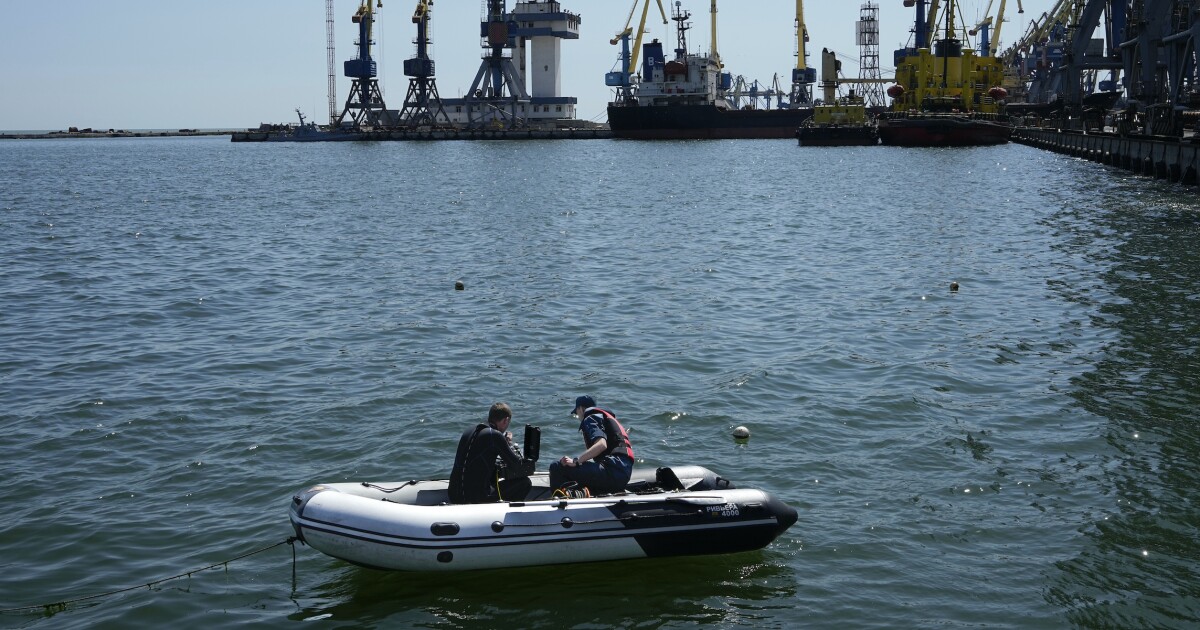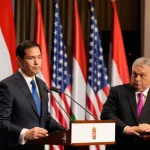

President Joe Biden’s administration has contemplated the lifting of sanctions on Belarusian dictator Alexander Lukashenko’s regime in a bid to secure the export of Ukrainian grain without risking the maritime confrontation with Russia that some other allies deem necessary to avert a horrific famine.
U.S. officials have broached the Belarus idea with European officials in recent weeks, as trans-Atlantic policymakers endeavor to escape a dilemma created by Russia’s blockade of Ukraine’s ports on the Black Sea. Yet other members of NATO have a growing interest in a maritime operation to challenge that blockade, given the limited amount of grain that could be sent out of Ukraine by rail and the political risks of an appeal to Lukashenko, who allowed Russia to attack Ukraine from Belarusian territory, after presenting his own threats to neighboring NATO and European Union members.
“It is clear that no one wants to ask Lukashenko directly,” a senior European official involved in the conversations told the Washington Examiner. “There’s only that we have bad options to relieve world hunger, which is looming in half a year.”
Biden’s team has denounced Russia’s blockade of Odesa, the most important Ukrainian city on the Black Sea, but evinced little interest in a maneuver to break it. An initiative to flout the blockade would require not only a tense stare-down with Moscow but also a plan to prevent Russian naval forces from attacking the port after Ukrainian forces clear their defenses in order to make way for the international flotilla.
RUSSIAN STRIKE ON UKRAINIAN BRIDGE RAISES STAKES IN GLOBAL FOOD CRISIS
“There’s a very clear understanding that Ukraine is not going to just allow this maritime route to be opened if this does not come with some very solid security guarantees,” a second senior European official told the Washington Examiner. “The Ukrainians are … not interested in having the naval route to be de-mined, and by doing that, exposing themselves to any potential naval assault from the Russians. So, they certainly need to have some kind of guarantees, military guarantees, from whoever can provide those.”
Such guarantees have been in short supply throughout the war, as Biden and other leaders of NATO have provided weaponry to Ukrainian troops but emphasized their unwillingness to deploy U.S. and allied forces in any operation that might risk a direct conflict with Russia. Yet some allies are trying to assemble a coalition in favor of a maritime initiative, despite Washington’s hesitance. Lithuanian Foreign Minister Gabrielius Landsbergis aired the argument publicly this week in London, where he met with British Foreign Secretary Liz Truss and outlined a plan for a multinational “nonmilitary humanitarian mission” to defy Russia’s blockade.
“In this endeavor, military ships or planes or both would be used to ensure that the grain supplies can leave Odesa safely and reach the Bosphorus without Russian interference,” Landsbergis told the Guardian. “We would need a coalition of the willing — countries with significant naval power to protect the shipping lanes, and countries that are affected by this.”
Other NATO allies regard U.S. naval power as an essential component of the prospective operation, given the importance of deterring Russian forces from attacking the flotilla. “It’s probably only America that Russia would be afraid of,” a Baltic official said. “If there was a coalition of America, Turkey, for example, and the U.K., saying, ‘We’ll escort the ships that can transport grain from Odesa,’ I don’t think that Russia would dare to attack those ships. … If America is out, Turkey and other countries won’t participate. If America is in, that’s easier to get other counties in.”
Turkish President Recep Tayyip Erdogan’s government has signaled to allies that he would join such an operation if another major naval power were involved, according to two European officials.
“They are ready, but they will not do it alone,” the second senior European official, who raised the curtain on intra-alliance dialogue on condition of anonymity, told the Washington Examiner.
Turkey’s willingness to join such an effort has not been reported previously. The Turkish Embassy in Washington did not respond to a request to discuss the matter.
Landsbergis’s willingness to argue his case in public reflects his apparent impatience with the Biden administration’s deliberations. U.S. officials floated the idea of looking to Belarus for assistance in a conversation with Landsbergis when he visited Washington in early May, according to a senior official from another country. (This private exchange has not been reported previously.) His trip took place as Biden was preparing for a trip to Illinois, where the president warned that “an awful lot of people in Africa are going to starve to death” if they are deprived of Ukrainian grain on account of “what the Russians are doing in the Black Sea.”
And so, U.S. and European officials together and separately have white-boarded alternative strategies that make use of ports in neighboring states around the region. Those initiatives offer only modest relief from the impending shortage, according to European officials. Ukrainian officials reportedly have shipped about 240,000 tons of grain through Romania’s port of Constanta, a pittance in comparison to Ukraine’s customary capacity.
Lithuania’s Port of Klaipeda could accommodate somewhat larger shipments, but it’s very difficult to get the grain to the city. It could be possible to send Ukrainian grain by rail through Poland, and then on to Polish or Lithuanian ports, but the Polish railways are not the same design as the Ukrainian rail lines; the train cars would have to park at the border to have their wheels changed to fit Polish systems. That would not be necessary if the trains followed a route across Belarus, but even if Lukashenko cooperates, that route can only handle a fraction of the necessary food supplies.
“By using the land route for getting the grain out, we can talk about only 20% to 30% of the grain that is supposed to be exported,” the first senior European official said. “So, this doesn’t seem to be a sustainable option or an option that would make a difference.”
Those calculations could account for Landsbergis’s public criticism of the Belarus options. “The Lithuanians got pissed off [because they] don’t want appeasement to one of the dictators [when] the appeasement will not lead to solving the issue anyway,” said the second senior European official. “It’s like doing something, but you’re not solving the looming, big crisis, but you have lost your [principled] position, actually.”
Those dynamics heighten the likelihood of a lethal famine that sparks a major mass refugee crisis, if U.S. and U.N. projections are correct. And, if the assessments of allied officials are correct, Biden’s only practical option to prevent that catastrophe requires an intervention to constrain Russia’s ability to threaten Ukraine from the sea — the sort of operation that they have regarded as a dreadful watershed in the war.
CLICK HERE TO READ MORE FROM THE WASHINGTON EXAMINER
“If you could avoid that, you will avoid that,” the second senior European official said in a moment of sympathy for the U.S. hesitance. “It’s very, very difficult.”







